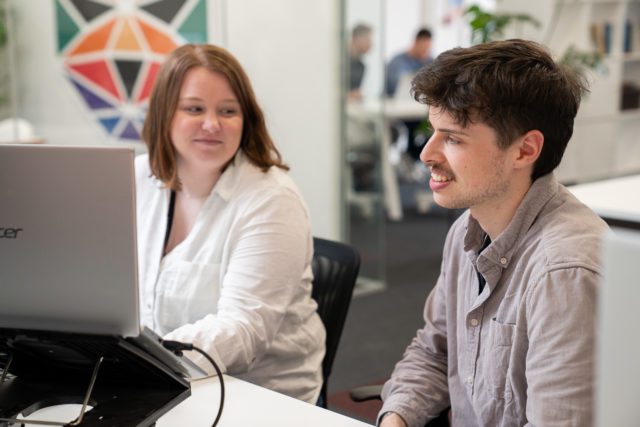While researching Search Engine Optimisation (SEO) you may have come across the phrase “technical SEO audit” or similar. This phrase may have you confused as to what a technical SEO audit is, why it’s important, and how it differs from other types of audits. According to Google, there are over 200 SEO ranking factors, however not all of them are technical; in this blog, we take you through a number of these technical SEO tasks and why they’re important for the health of your website.
So, what is a technical SEO audit and why is it important? A technical SEO audit reviews the technical fundamentals of a website including: indexing, search engine appearance, URLs, structured data, duplicate content, crawlability, linking, redirects, security, site speed, mobile usability & more. A website is more likely to succeed if these factors are optimised.
A technical SEO audit helps a Search Engine Optimiser, a website owner and any other involved parties understand where a website is failing or succeeding. Once a technical audit has been completed, an SEO professional will prioritise which areas of the website need focus first by understanding what technical SEO improvements will help the website gain searching ranking traction faster. There are many areas of technical SEO that are audited by SEO professionals. Technical SEO factors include:
While auditing for indexing and caching, an SEO professional will identify any obvious issues with how the site is indexed and presented in Google’s results. They should check for previous bad SEO practices that may now be harming the site, or issues that prevent desired pages from ranking and large numbers of low-value pages being indexed.
This is simply analysing how a site appears on a search engine results page by looking at the length, quality and appeal of meta titles and meta descriptions. Meta titles are an important factor that Google uses to determine what a page is about.
SEO professionals review the appearance, content and structure of a website’s URLs. This is important as it can influence how users and search engines first perceive and navigate through a website. This includes a review of URLs which are too long, contain unnecessary parameters or don’t reflect the content that is on the page, among other checks like canonicalisation.
Structured data can be used to help search engines understand the meaning of a page or classify information within a page. Websites which contain structured data may be indexed more accurately, and correctly marked-up pages could be eligible for ‘rich results’ when returned in Google’s index – an enhanced result which can have a positive influence on click-through rates. This is also referred to as Schema. By using the Rich Results Test tool from Google, we can easily check if a website has structured data on a page.
Google Analytics and website tracking play a vital part in the success of a website’s SEO campaign. Having an account that is configured in the correct manner is key as it allows tracking of KPIs, evaluation of progress, and identification of issues and opportunities throughout the website’s lifespan.
Duplicate content can be harmful to a site’s rankings as Google may interpret it as regurgitated, stolen, low value or unoriginal. To achieve high-ranking positions, it is imperative to have valuable content that is unique. Often duplication issues arise due to an oversight or because of third-party use. No matter how duplication comes about, it needs to be identified then addressed. Some duplicate content, such as quotations, is generally considered admissible, especially if linked to a source.
Learn more about duplicate content in our recent blog where we go into more detail about the different types of duplicate content, and how to fix it. Or, learn more about canonicals in our blog, How to Audit Canonical Tags for SEO.
A crawler (e.g. Googlebot) scours the web by ‘crawling’ from page to page, often via internal and external links. It’s important that search engines can effectively crawl key pages and all resources on a website to provide the clearest picture of what the site has to offer. Find out what Google actually sees when it crawls your website in our blog, What Does Google See When it Crawls Your Site?
Links between pages, both in a site’s navigation and contained within content, enable search engines to crawl more effectively and interpret each page’s respective importance and subject matter. Strong linking protocols are also important in ensuring a good user experience on site where all content can be accessed as intended.
A number of miscellaneous technical best practices which should be adhered to so that search engines can interpret a website in their intended way. Key problems to avoid include issues around redirects and how content is being served.
Site speed is an important factor in determining a good user experience. Having pages that load really slowly can have an adverse impact on ranking performance, though even if a site is fast there are often improvements that could be made. Google’s own site performance tool, PageSpeed Insights, can help understand how well a website is performing in this area.
We recently published an entire blog on how to audit your site speed and performance, as well as offering a few tips on how to improve your site speed. Learn more here.
Most search queries are now completed on a mobile device, which is why search engines are now primarily focusing on how content is served on mobile. For this reason, it’s very important to ensure a website has a high degree of mobile usability, avoiding issues in relation to intrusive interstitials, responsiveness and button sizes.
If your website is trying to appeal to users of different regions and languages, it is essential to get the fundamentals right in relation to international SEO. This means ensuring Hreflang values are correct along with basics such as content and currency.
Using Screaming Frog’s SEO Spider, a website can be crawled to find out whether Hreflang tags have been implemented.
By performing a technical SEO audit, it helps an SEO professional, along with any other involved parties, understand where the website is failing and succeeding. Once these have been identified, any website failures can be prioritised for fixes.
After completing a technical audit, website issues that weren’t previously understood can be uncovered, and some of these may have a massive impact on the website’s success. For example, if a key page is accidentally no-indexed due to a small setting within the admin area of the site, but this is changed as a result of the technical audit, it could result in an improvement in rankings over time, which can then result in an boost of traffic, and then follow with an increase in enquiries, sales, or conversions.
It is hard to determine the length of a technical SEO site audit for many different reasons. This depends on how experienced the person is conducting the technical audit, how many pages the website has, how fast the computer is, how fast different software is for different areas of the audit, how many technical issues there are (if there’s more usually the audit takes longer), what software is being used to conduct different areas of the audit, among many other factors. However, the average technical site audit can take 1.5 – 3.5 hours to complete.
It’s understandable that the layman would be confused with the two terms ‘content SEO’ and ‘technical SEO’. An SEO professional should conduct both a technical site audit and a content site audit as a part of a campaign setup. This is because both are very different but extremely important to a website’s campaign success.
Technical SEO refers to the technical factors of a website as mentioned above including:
Content SEO refers to how well produced the content on a website is, including on blogs, key landing pages, service pages, product pages, product category pages, and the homepage. This content has to be optimised for keywords, user experience, and conversions. By reviewing the content on a website, and then improving any that’s underperforming, it can result in an increase in search engine rankings and an increase in conversions.
Learn more about content audits in our recent blog where we go into detail about all of the various factors that should be reviewed as part of a content audit.
Wildcat Digital is a digital marketing agency in Sheffield that provides SEO services to businesses and organisations that want to punch above their weight online. We conduct technical SEO site audits within the setup of every campaign with information on where a website is doing well or needs improvement. Get in touch for more information regarding our SEO services or for a free, no-obligation consultation.

Founder
Our founder, Will Hitchmough, worked at a number of high profile Sheffield Digital Agencies before founding Wildcat Digital in 2018. He brings an extensive knowledge of all things related to SEO, PPC and Paid Social, as well as an expert knowledge of digital strategy.
Digital Marketing can be a minefield for many businesses, with many agencies ready to take your money without knowing how to deliver results. I founded Wildcat Digital to deliver digital success to businesses with smaller budgets in a transparent way.

Head of Growth
Rich joined us in May 2024 to head up our growth team. With years of experience helping other agencies to grow, Rich joins us at an exciting time as Wildcat is working on a five-year plan to become one of the biggest agencies in the UK.
Outside of work, Rich is a father to three children, which keeps him very busy! He’s also recently started running again to keep fit and loves a bit of DIY.

Head of Digital
Sarah joined Wildcat in January 2025, bringing over seven years of SEO expertise to the team. With a background in Fashion Communication and Promotion, she has worked both in-house and at agencies, covering a range of digital marketing specialisms before focusing on SEO.
Passionate about all things search, Sarah thrives on helping brands grow their online presence.
Outside of work, she enjoys walking her dog, running, and shopping for vintage clothing.

Office Manager
Amelia joined Wildcat Digital in January 2025, bringing extensive experience in HR, Health & Safety, Facilities Management and IT Support. Previously an Operations Manager at The University of Sheffield, she has a strong background in creating efficient and well-organized work environments.
Specialising in HR, Health & Safety, and Facilities Management, Amelia ensures the Wildcat Digital team has the resources and support needed to thrive. Whether managing office operations, maintaining compliance, or fostering a positive workplace culture, she keeps everything running smoothly.
Outside of work, Amelia loves trying new things, traveling, camping, and walking. She also enjoys socialising and exploring new places with friends and family. Her adventurous spirit and proactive approach make her a valued member of the team.

Client Success Coordinator
Siena joined us in 2023 with a background in sales and digital marketing. She leads on client relationships across the company, ensuring that our customers are happy throughout their journey with us, from their initial consultation through to onboarding and beyond.
Outside of work, Siena enjoys travelling and getting stuck into the local culture. She likes to make the most of her experiences and particularly enjoys watching sunrises and sunsets from beautiful locations around the world.

SEO Account Director
Paul has a strong background in SEO, having previously founded and ran a successful eCommerce business, as well as running a personal blog that achieves an average of 17K users per month. Paul’s knowledge of SEO is extensive, with a strong emphasis on client handling and technical SEO.
Outside of work, Paul enjoys spending time with his family and staying active with weight lifting and combat sports.

Team Lead & Technical SEO Account Manager
With a degree in Computer Science and SEO experience dating back to 2017, Dariusz has a wide range of SEO skills and knowledge. His specialist knowledge of Technical SEO has firmly landed him the title of Wildcat’s Technical Wizard, and he has recently taken on the responsibility of Team Leader for the Panthers Team.
In his spare time, Dariusz loves hiking, experimenting and trying new coffees and loves learning new things. He is currently learning more about CRO and AI and how this could benefit our clients.

Team Lead & Senior SEO Account Manager
With a background in sales, Molly is a natural Account Manager, brilliantly handling any issues that come her way. Having joined us as a Digital Marketing Executive, and working part-time through her final year of University, Molly is a shining example of how hard work pays off. She is now an SEO Account Manager with a particular interest in Content and Client Management.
In her spare time, Molly loves to get out in nature, hiking and exploring the Peak District. She also loves cooking and likes to unwind with a bit of yoga.

PPC Team Leader
Libby joined Wildcat in 2021 as our first PPC hire. With a degree in Digital Media Production, a Master’s in Digital Media Management and previous experience in Social Media Management, Libby hit the ground running and has since climbed the ranks to Senior PPC Account Manager and has a particular interest in the eCommerce sector.
Outside of work, Libby likes gaming, and cooking and likes to keep active by lifting weights.

Senior SEO Account Manager
With a degree in Film and TV production, and a varied career history, Jamie made the move to marketing with a Masters degree in Digital Media Management. He has since worked in SEO at Agencies across Sheffield, before joining Wildcat and working his way up to SEO Account Manager. Jamie has a particular interest in backlinks and Digital PR and has recently gained a client a valuable backlink from Forbes!
In his spare time, Jamie is an avid foodie and loves trying new restaurants and cuisines. He also loves to travel and spent a year travelling to Australia after university.

SEO Account Manager
Jasmine joined Wildcat in 2022 with a strong background in SEO and Account Management. At the time, she was finishing up a Level 4 Apprenticeship in Digital Marketing from the Chartered Institute of Marketing, and has since worked her way up to SEO Account Manager. Jasmine excels at content writing and promotion, and particularly enjoys finding creative ways to join the dots on multi-channel campaigns.
In her spare time, Jasmine volunteers at a charity, helping combat loneliness & social isolation experienced by older neighbours. Outside of Wildcat, she owns a catering company, Savery Grazing, creating delicious grazing tables & platters for a range of events. She also loves skiing and exploring the Peak District.

Senior SEO Executive
After spending ten years managing businesses, restaurants, cafes and event spaces across Sheffield, Jon decided to change careers and joined Wildcat as an SEO Executive in 2022. He especially enjoys the client management side of the job, helping them to understand digital marketing and ways in which they can build their business’s presence online.
Outside of work, Jon likes to keep fit with running, badminton and football, and also loves music.

Senior SEO Executive
Andy joined Wildcat in 2023 after starting his digital marketing career in-house for a local Sheffield company. Since joining, he has developed a strong interest in Technical SEO and has strong skills in Account Management.
Outside of work, Andy loves music and plays in a couple of bands. He also enjoys rock climbing, cycling, photography and good food.

PPC Executive
Before joining Wildcat, Tom worked across different industries, building skills in sales and customer service. He later developed a passion for digital marketing whilst working on personal marketing projects and freelance ventures, and gained numerous certifications in PPC and Social Media.
Outside of work, Tom enjoys staying active by going to the gym and hiking. He also loves travelling and motorbiking.

Senior SEO Executive
Kezia joined us in July 2024 after completing a CIM Certificate in Digital Marketing and gaining experience in Content SEO at another Sheffield agency.
In her spare time, Kezia loves to get outdoors, bouldering, hiking and travelling.

Senior PPC Executive
Alex joined Wildcat Digital in December 2024 as a Senior PPC Executive, bringing a strong background in Paid Media, Paid Social, and Programmatic advertising. With a degree in Business & Marketing and Google Ads certifications, she has the expertise to craft high-performing campaigns that drive results.
Before joining Wildcat Digital, Alex worked at two leading agencies in Leeds, honing her skills across various digital advertising platforms. Her analytical mindset and strategic approach help businesses maximize their online presence and advertising budgets.
Outside of work, Alex enjoys spending time with her dog, Lola, and going on walks with her dog walking group. She’s also a keen footballer and loves playing five-a-side whenever she gets the chance. Her enthusiasm and team spirit make him a great addition to the Wildcat Digital team.

SEO Executive
Amy joined Wildcat in 2024 with a background in journalism, having worked as a News Editor and Editor-in-Chief at The Sheffield Tab. She is naturally interested in Content SEO and research, so will no doubt prove to be a content power-house.
In her spare time, Amy loves watching crime shows, listening to music and hanging out with her dog, Eddie!

SEO Executive
Reiss joined the Wildcat Digital team in July 2025, with a background in journalism and digital content, Reiss brings both creativity and technical know-how to the team.
After graduating with a Journalism Studies BA from the University of Sheffield, where he also served as Games Editor and Deputy Editor for the student-run newspaper – Reiss jumped straight into the world of climate tech communications.
Outside of work, Reiss loves crochet, swimming, playing guitar, and diving into both video and board games. He’s always up for picking up new skills and trying new things – which makes him a perfect fit for our team!

Content & Proposal Writer
Liv joined the WildcatDigital Team in June 2025, with a strong background in financial admin and client care, Olivia is taking an exciting step into the creative world – and we’re so glad she’s doing it with us!
She’s currently studying content creation through her apprenticeship with Wildcat, and already bringing fresh energy and creativity to the team.
Outside of work, Olivia runs her own BIAB nail business, loves reformer Pilates, long walks, and is a member of a competitive dance team.

January 26, 2026
We made it to the end of January! One month into 2026, and it feels like a lot has changed.…

January 23, 2026
Many businesses assume that Author and Meet the Team pages are simply a nice way to showcase the people behind…

December 17, 2025
As we enter into 2026 and reflect back on the year as business owners and digital marketers, we can’t help…